
It’s official: the full title of our upcoming book is “Real Fake – Playing with Reality in the Age of Artificial Intelligence”.
“Real Fake” is our take on synthetic media and the follow-up to our 2008 book “Me the Media”. Real Fake is about how humans continuously manipulate reality and how new digital technology tools enable us to go one step further in this ancient game. This includes modern phenomena like conspiracy theories such as QAnon, Deepfakes, and fake news, but also virtual humans such as CGI Influencer Lil Miquela and virtual worlds like Fortnite.
The Internet Wants to Watch You Eat

“What the internet has done is allow more people the ability to film their daily routines and upload the results, sharing them with a bigger audience than ever before. Part of the appeal is nosiness. But many of the videos are also designed to make it feel as if the viewer is with a friend. Watching someone eat online seems to help some viewers feel less alone. Dining is a social activity, after all. Perhaps it makes sense that this side of our social lives is moving online, along with everything else.”
In our report “The Synthetic Generation” we already talked about Mukbang and ASMR. Due to the Corona pandemic these trends have only become bigger. I never heard about TikTok influencer Eden Harvey and her “Time to eat with Eden”. She has more 2.4 million followers and she’s helping people who are struggling with eating disorders by sharing a “virtual meal”. She’s amazing!
MUST WATCH I: The Synthetic Generation
TikTok’s Catfish Problem Is Worse Than You Think

“A disturbing video is circulating on TikTok. It’s an explainer on a content creator who, it seems, posts nude photos of herself while digitally transforming her face to look younger — like, a teenager. […] If you scroll far enough back on her Instagram, you can see the slow transformation of an unmistakable adult into a rather uncanny-looking teen, despite most of the content — boobs, butts, a cascade of red hair — remaining the same. At a certain point, the line between “typical influencer FaceTune magic” and “actively impersonating a minor” appears to be crossed.”
The boundaries between what’s real and what’s not are disappearing at an alarming rate. Sometimes it’s just for fun, like the CGI influencer Lil Miquela, and sometimes people like Coconutkitty143 do it for money and basically to hurt people. “The promise of the internet was that we could be anyone we want. What did we expect?”
AI Voice Actors Sound More Human Than Ever

“A new wave of startups are using deep learning to build synthetic voice actors for digital assistants, video-game characters, and corporate videos. […] But the rise of hyperrealistic fake voices isn’t consequence-free.”
The Flemish Scrollers

“Every meeting of the flemish government in Belgium is live streamed on a youtube channel. When a livestream starts the software is searching for phones and tries to identify a distracted politician. This is done with the help of AI and face recognition. The video of the distracted politician are then posted to a Twitter and Instagram account with the politician tagged. Project by @driesdepoorter”
Is this a good or a bad thing? What do you think?
MUST WATCH II: Mark Zuckerberg Celebrating July 4th
The video of Mark Zuckerberg riding an electric surfboard holding the American flag is not a deepfake, it’s real.
The Internet Is Rotting

“Too much has been lost already. The glue that holds humanity’s knowledge together is coming undone. […] It turns out that link rot and content drift are endemic to the web, which is both unsurprising and shockingly risky for a library that has billions of books and no central filing system. […] Society can’t understand itself if it can’t be honest with itself, and it can’t be honest with itself if it can only live in the present moment. It’s long overdue to affirm and enact the policies and technologies that will let us see where we’ve been, including and especially where we’ve erred, so we might have a coherent sense of where we are and where we want to go.”
Roblox wants to build the Metaverse. Can it?

“What has made Roblox unique in its field has been the interplay between its enormous constellation of experiences and its personalised avatar system. When you enter any given Roblox world, the user does not assume control of a context-relevant character (think Sonic, Mario, or Lara Croft) but as your persistent, user-created avatar. A virtual You, effectively – whoever you’ve chosen to be. Add to that an attendant in-game economy which has sprung up to support this expression of identity, with all sorts of user-generated clothing, hairstyles, accessories and skins available to purchase in the platform’s avatar shop. Roblox offers an opportunity, then, not just for play, but for digital-first designers and entrepreneurial retailers.”
Roblox is a combination of media, gaming, entertainment and commerce, and it shows the future of social interaction. But who controls the mediation of all this information? If any company were able to consolidate power over the Metaverse’s formation and become its de facto gatekeeper, the control they could wield over the dissemination of information and in setting their own commercial and security practices would be enormous…
Cryptocurrencies’ Dream of Escaping the Global Financial System Is Crumbling

“The future for crypto now looks less like a techno-utopian dream or libertarian fantasy, and more like subordination to the very thing it was designed to overthrow: the nation state’s monopoly over the money supply.”
MUST WATCH III: Extinct Animals Come to Life in this Museum
Contact
Playing with Reality is a weekly newsletter in which SogetiLabs’s Research Institute VINT examines the future where synthetic reality becomes part or our objective reality. We investigate the impact of new technology on people, organisations and our society. If you have any questions or comments, do not hesitate to contact us. You can reach us at vint@sogeti.com.

 English | EN
English | EN 